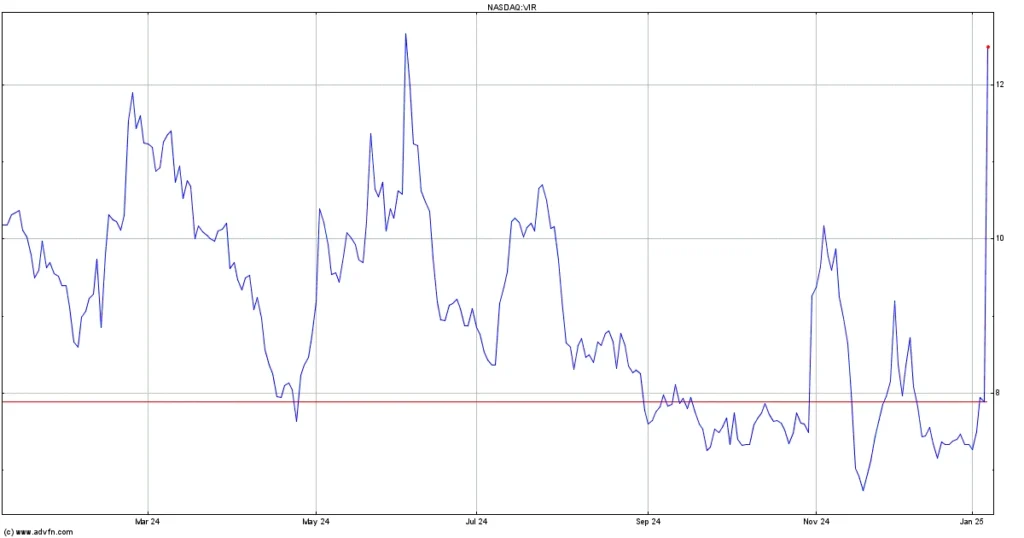
Vir Biotechnology Reports Positive Data in Ongoing Trials for VIR-5818 and VIR-5500
Vir Biotechnology, Inc. (Nasdaq: VIR) has presented encouraging preliminary Phase 1 data from two of its dual-masked T-cell engagers (TCEs): VIR-5818, which targets HER2-expressing solid tumors, and VIR-5500, aimed at prostate-specific membrane antigen (PSMA) in metastatic castration-resistant prostate cancer (mCRPC). The data indicate promising early safety and efficacy profiles, with no dose-limiting cytokine release syndrome (CRS), and the maximum tolerated dose (MTD) still being explored as dose escalation continues. Notably, early signs of clinical responses have been observed in heavily pretreated patients. These results underscore the potential of Vir Biotechnology’s in-licensed PRO-XTEN™ masking technology, designed to activate TCEs selectively in the tumor microenvironment, minimizing damage to healthy cells and reducing toxicity.
“Overcoming the toxicity-driven limitations of traditional T-cell engagers could address an important unmet medical need in cancer care,” said Marianne De Backer, M.Sc., Ph.D., MBA, Chief Executive Officer. “Preliminary safety and efficacy data for5818 and 5500 are compelling, and we will continue dose escalation with an opportunity to expand the therapeutic window. We are encouraged that our candidates may enable efficacious and well-tolerated treatment regimens, potentially improving outcomes for people living with a range of solid tumors.”

VIR-5818: A Potential First-in-Class HER2 Immunotherapy
HER2-targeted therapies are already in use, but there remains an unmet need for new treatments that offer better tolerability and extend survival, especially for solid tumors. There are currently no approved HER2-directed immunotherapies for solid tumors. The preliminary data for that the tumor-specific activation of PRO-XTEN™ dual-masked TCEs may improve the therapeutic index of these agents.
VIR-5818 is being tested in a Phase 1 clinical trial (NCT05356741) to assess its safety, pharmacokinetics, and potential efficacy as a monotherapy and in combination with pembrolizumab. The trial includes participants with various HER2-expressing cancers, such as breast and colorectal cancer (CRC). As of the data cut-off, 79 patients—many of whom were heavily pretreated—have been enrolled in monotherapy cohorts.
Initial efficacy data from the study show that 50% (10/20) of patients receiving doses of VIR-5818 ≥400 µg/kg experienced dose-dependent tumor shrinkage across multiple HER2-positive tumor types. Notably, a subset of participants with HER2-positive CRC, who had exhausted standard treatments, showed a confirmed partial response (cPR) in 33% (2/6) of cases at early doses, with one patient maintaining a cPR for more than 18 months.
Preliminary safety data indicate that VIR-5818 is generally well tolerated, with minimal grade 1 (20%) and grade 2 (10%) CRS, and no grade 3 or greater CRS observed across doses up to 1000 µg/kg. Most treatment-emergent adverse events (TEAEs) were low-grade, reversible, and manageable. The MTD has not yet been reached. Additionally, pharmacokinetics data suggest low systemic unmasking of the TCE, implying tumor-specific activation. The half-life of VIR-5818 is approximately 6 days, allowing for a less frequent dosing regimen, and a Q3W dosing schedule is being evaluated.
VIR-5500: A Dual-Masked PSMA-Targeting TCE for Prostate Cancer
Prostate cancer is the second most diagnosed cancer in men, and despite advancements in treatment, there is still a significant need for well-tolerated therapies that can extend survival and improve the quality of life. This is currently being tested in a Phase 1 clinical trial (NCT05997615) to assess its safety, pharmacokinetics, and preliminary efficacy in participants with mCRPC. The study has enrolled 18 participants who have received 3 to 6 prior lines of therapy.
Early efficacy data show promising signs of prostate-specific antigen (PSA) responses. PSA reductions were observed in 100% (12/12) of patients after the initial dose ≥120 µg/kg, and 58% (7/12) of these patients demonstrated a PSA50 response (a 50% reduction in PSA). These results provide early evidence of the potential effectiveness of VIR-5500 in mCRPC.
Preliminary safety data also suggest a favorable profile , with no dose-limiting toxicities observed at doses up to 1000 µg/kg without prophylactic corticosteroids. The majority of TEAEs were low-grade, with minimal CRS (17% grade 1, 11% grade 2), and no grade 3 or higher CRS was observed. The dual-masking approach seems to mitigate off-target toxicities, as no hearing loss has been reported—often a concern with PSMA-targeting therapies. The MTD for VIR-5500 has not yet been reached, and dose escalation is ongoing. Pharmacokinetics data suggest tumor-specific activation with minimal systemic unmasking. The dual-masked TCE has a half-life of 8-10 days, allowing for a Q3W dosing regimen, which is currently under evaluation.
About VIR-5818, VIR-5500, and VIR-5525
These are investigational clinical candidates designed for the treatment of solid tumors. These therapies utilize this Biotechnology’s PRO-XTEN™ masking technology, which employs different TCEs targeting HER2, PSMA, and EGFR, respectively.
T-cell engagers are powerful anti-cancer agents that direct the immune system to destroy cancer cells by activating T-cells. The PRO-XTEN™ technology is designed to keep these TCEs inactive until they reach the tumor microenvironment, where specific tumor-related proteases cleave off the mask, thereby activating the TCEs and selectively killing cancer cells. This targeted approach reduces the toxicity associated with traditional TCEs, increases their efficacy, and allows for longer periods of circulation in the bloodstream. This may lead to less frequent dosing and better outcomes for patients.
This Biotechnology is committed to further exploring these promising therapies and advancing the development of these dual-masked T-cell engagers to help address unmet needs in cancer care.
Please find the related post




